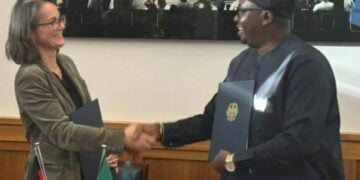Vice President Kashim Shettima yesterday said Nigeria is strategically positioned to anchor a new era of intra-African trade and investment, leveraging its market size, innovation hubs and economic weight to lead the continent’s next phase of growth.
His Deputy Chief of Staff, Alhaji Ibrahim Hassan Hadejia, delivered the message at the High-Level Conference on Intra-African Trade, convened by Woodhall Capital at the Presidential Villa, Abuja.
The conference, held ahead of investment roadshows in London, Dubai and Abu Dhabi, brought together governors, investors, development finance institutions, members of the diplomatic corps and heads of key ministries and agencies.
Shettima commended Woodhall Capital for what he called an “audacious and patriotic initiative” to raise international funding for both sovereign and subnational partners, describing it as a model for translating potential into measurable opportunities.
“For too long, the narrative of African trade has been dictated by what we extract and export to the Global North,” the vice president said, “Today, we must pivot and activate the vast untapped energy of intra-African trade. While trade within the EU and Asia stands at 65 and 60 percent respectively, Africa’s intra-continental trade remains below 17 percent. That must change.”
He noted that the revolution would not be driven by Abuja alone, but by subnational structures capable of presenting credible, de-risked and market-aligned projects to global investors.
“Governors must take the lead in driving this transformation. As a government, we recognise that to attract sustainable investment, we must build an environment anchored on predictable policy, institutional transparency and accountability,” he added.
Reiterating the Tinubu administration’s reform priorities, Shettima said government remained committed to stabilising the naira, rationalising subsidies, simplifying trade integration and improving the business climate through the Presidential Enabling Business Environment Council (PEBEC).
“Capital follows confidence, and confidence follows governance,” he declared, “The capital is ready, the markets are ready, and the world is watching.
This is Nigeria’s moment to redefine its place in Africa’s economic story, not as a participant, but as a leader.”
Chairman of the Nigeria Governors’ Forum (NGF) and Kwara State Governor, AbdulRahman AbdulRazaq, reaffirmed the commitment of states to create enabling environments for investors. Represented by Zamfara State Governor Dauda Lawal, AbdulRazaq said sub-nationals remained the key to unlocking Africa’s next wave of trade and industrial growth.
He cited the NGF’s partnership with Woodhall Capital and Afreximbank as a major step toward linking state-level project pipelines with credible global financiers, noting that the upcoming investor roadshows would showcase viable state-led projects in energy, agriculture, logistics, infrastructure and the creative economy.
“This meeting is not just a prelude to our international mission,” he said, “It is a declaration that Nigerian states are open for business, already bankable and globally competitive.”
Afreximbank’s Acting Regional Chief Operating Officer and Head of Mission, Anglophone West Africa, Mr. Alain-Thierry Mbongue, who represented the bank’s President, Prof. Benedict Oramah, reaffirmed the institution’s commitment to supporting subnational governments across Africa to attract investments and deepen intra-African trade.
Mbongue described the forum as “a pivotal juncture in Nigeria’s investment narrative,” highlighting Afreximbank’s African Sub-Sovereign Government Network (AfSNET) as a platform enabling governors, mayors and regional leaders to exchange knowledge and access tailored financing tools.
“Our philosophy is simple — development must be decentralised,” he said, “It must begin where needs are most keenly felt, in cities, provinces and regions, and radiate outward to influence national and continental progress.”
He announced that the next AfSNET Investment Forum will be hosted in Cross River State in 2026.
Earlier, President of Woodhall Capital, Mrs. Mojisola Hunponu-Wusu, urged investors to leverage Nigeria’s evolving economic landscape, describing the forum as “a convergence of purpose, partnership and vision.” She praised President Bola Tinubu’s economic reforms — including forex liberalisation, exchange rate unification and capital market deepening — as catalytic measures that have boosted investor confidence and repositioned Nigeria as a competitive investment destination.
“This forum is not merely a conversation; it is a bridge connecting policy with capital, Nigeria with the world, and vision with measurable impact,” she said. “No longer do we go with begging bowls to international countries. We believe there’s investment onshore, on the continent.”
She announced that the NGF–Woodhall Capital investor roadshows in London, Dubai and Abu Dhabi will provide states with platforms to engage financiers and strategic partners directly.
Hunponu-Wusu also commended Afreximbank for its consistent support, describing the institution as “a big brother to Woodhall Capital,” and paid tribute to its outgoing President, Prof. Oramah, while expressing confidence in the incoming President, Dr. George Elombi, to build on his legacy.
With Nigeria positioning itself at the centre of Africa’s trade revolution, stakeholders at the Villa forum agreed that the synergy between visionary political leadership, financial innovation and disciplined capital deployment could redefine the continent’s economic future





